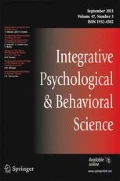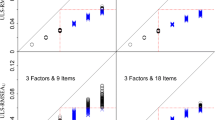Abstract
Smedslund (Psychol Inq 2(4):325–338, 1991) has demonstrated that much of the experimental research in psychology is pseudo-empirical—empirically testing what can be determined a priori based on the meanings of everyday psychological terminology. The present article shows how Smedslund’s general perspective is consistent with certain aspects of a theoretical model of the narrative form, and how the latter provides a useful lens for making sense of pseudo-empiricism. This raises a paradox: While something along the lines of the narrative element of ‘trouble’ is required as a premise for research, trouble is not possible in the context of questions of the general relation between everyday psychological concepts. This paradox is resolved by showing how certain methodological and discursive characteristics of research—specifically, the reification and abstraction of psychological terminology, quantification, and the statistical analysis of group-level results function to obscure the absence (and impossibility) of trouble and/or to create the illusion of its presence.
Similar content being viewed by others
Notes
For the sake of illustration, we are accepting the theoretically dubious notion that beliefs (or attitudes or desires) are things that a person literally ‘has’, in an objective, discourse-independent sense.
This does not apply to applied research, which is rightfully concerned with ephemeral patterns and ‘momentary stabilities’. Nor does it apply to research bridging psychology and other fields, e.g., neurology, since this work entails matters that go outside the domain of everyday psychological terminology.
This is illustrated by the ongoing replication crisis where evidence that research has been improperly reported or cannot be replicated is taken as automatic grounds for calls that it be rejected. For example, in the context of the recent calls for the Stanford Prison Experiment (SPE) to be “discarded” in light of evidence that the received account from Philip Zimbardo (Haney, Banks & Zimbardo, 1973) misreported the original events (Haslam, Reicher & Van Bavel, 2019; La Texier, 2019), the fact that the experiment has provided an engaging and convincing account for students in introductory psychology classes for decades would not be an acceptable rebuttal.
Gibson’s warning that the field is “ill-founded [and] at any time the whole psychological applecart might be upset” (1967, p. 21), has been borne out in reports that experimental research conducted with the goal of corroborating provisional theories inevitably undermines and complicates them, rapidly rendering them untenable. Examples can be found in social psychology (Klein, 2014; Thorngate, 1976), personality (Lamiell, 1987), cognitive science (Newell, 1973, pp. 288–289), and cognitive psychology (Kloos & Van Orden, 2009), among other places.
This question pertains specifically to basic research because the goals of applied research render the issue of pseudo-empiricism irrelevant. Although the focus of an applied research study—e.g., the relation between different attitudes—may be considered pseudo-empirical, insofar as the research is being conducted with the sole goal of informing/guiding some later decision making, rather than discovering lawlike relations between attitudes, the charge of pseudo-empiricism is irrelevant.
This is reflected by the fact that the researchers were able to design the experiment in the first place. If the typical psychological significance and consequences of the various parts of the experiment were not matters of common sense identification, the design and use of the experiment itself would have no justification. (Along these lines, it should be noted that the fact that the experiment shows empirical results that are suggested to conflict with common-sense expectations begs the question of why the latter expectations should be open to dispute when the study presumes the validity of others).
Note The current analysis is agnostic with respect to whether the changes in average task enjoyment at the group level reported by Festinger and Carlsmith are valid and generalizable.
Festinger and Carlsmith characterize the focus of their study in objectified terms, which effectively demotes the authority of commonsense expectations about attitudes and desires. For example, they ask “what happens to a person’s private opinion if he is forced to do or say something contrary to that opinion?” (p. 203), implying that opinions are not private or public affective/discursive events, but static, persistent cognitive objects that a person “privately holds” (p. 203) and which may be modified. Similarly, the participant is not actively thinking but instead “has two cognitions which, psychologically, do not fit together” (p. 203). Finally, participants’ expression of attitudes about how enjoyable they found the task are not spontaneous utterances, but rather, answers collected via likert scale survey.
Lamiell (2018, p. 474) provides an excellent example.
References
Aronson, E. (2011). The social animal. Worth Publishers.
Bandura, A. (1977). Self-efficacy: Toward a unifying theory of behavioral change. Psychological Review, 84, 191–215.
Bickhard, M. H., & Terveen, L. (1996). Foundational issues in artificial intelligence and cognitive science: Impasse and solution. Elsevier.
Bourdieu, P. (1990). The logic of practice. Stanford University Press.
Bruner, J. (2004). Life as narrative. Social Research, 71(3), 691–710.
Bruner, J. S. (1986). Actual minds, possible worlds. Harvard University Press.
Bruner, J. (1990). Acts of meaning. Harvard University Press.
Burke, K. (1969). A grammar of motives (2nd ed.). University of California Press.
Churchland, P. S. (1989). Neurophilosophy: Toward a unified science of the mind-brain. MIT press.
Danziger, K. (1990). Constructing the subject: Historical origins of psychological research. Cambridge University Press.
Derksen, M. (1997). Are we not experimenting then? The rhetorical demarcation of psychology and commonsense. Theory & Psychology, 7(4), 435–456.
Dreyfus, H. (1972). What computers can’t do: The limits of artificial intelligence. MIT Press.
Festinger, L., & Carlsmith, J. M. (1959). Cognitive consequences of forced compliance. The Journal of Abnormal and Social Psychology, 58(2), 203–210.
Gergen, K. (1989). The possibility of psychological knowledge: A hermeneutic inquiry. In M. J. Packer & R. B. Addison (Eds.), Entering the circle: Hermeneutic investigation in psychology (pp. 239–258). State University of New York Press.
Gibson, J. J. (1967). Autobiography. In E. G. Boring & G. Linzey (Eds.), A history of psychology in autobiography (Vol. 5, pp. 127–143). Appleton-Century-Crofts.
Gopnik, A., & Wellman, H. M. (1992). Why the child’s theory of mind really is a theory. Mind and Language, 7, 145–171. https://doi.org/10.1111/j.1468-0017.1992.tb00202.x
Gozli, D. (2020). Experimental psychology and distortions of common sense. Respect for Thought, Jan Smedslund’s Legacy for Psychology. https://doi.org/10.1007/978-3-030-43066-5_14
Grice, J. W. (2015). From means and variances to persons and patterns. Frontiers in Psychology, 6, 1007. https://doi.org/10.3389/fpsyg.2015.01007
Haney, C., Banks, W. C., & Zimbardo, P. G. (1973). A study of prisoners and guards in a simulated prison. Naval Research Reviews, 9(1–17), 14–65.
Harré, R. (1979). Social being: A theory for social psychology. Blackwell.
Harré, R. (1999). The rediscovery of the human mind: The discursive approach. Asian Journal of Social Psychology, 2(1), 43–62.
Haslam, S. A., Reicher, S. D., & Van Bavel, J. J. (2019). Rethinking the nature of cruelty: The role of identity leadership in the Stanford Prison Experiment. American Psychologist, 74(7), 809–822. https://doi.org/10.1037/amp0000443
Hutto, D. D. (2008). Folk psychological narratives. MIT Press.
Klein, S. B. (2014). What can recent replication failures tell us about the theoretical commitments of psychology? Theory & Psychology, 24(3), 326–338.
Kloos, H., & Van Orden, G. C. (2009). Soft-assembled mechanisms for the grand theory. In J. P. Spencer, M. Thomas, & J. McClelland (Eds.), Toward a new grand theory of development? Connectionism and dynamics systems theory reconsidered (pp. 253–267). Oxford University Press.
Lamiell, J. T. (1987). The psychology of personality: An epistemological inquiry. Columbia University Press.
Lamiell, J. (2018). From psychology to psychodemography: How the adoption of population-level statistical methods transformed psychological science. American Journal of Psychology, 131(4), 471–475.
Le Texier, T. (2019). Debunking the stanford prison experiment. American Psychologist, 74(7), 823–839. https://doi.org/10.1037/amp0000401
McGeer, V. (2001). Psycho-practice, psycho-theory and the contrastive case of autism. How practices of mind become second-nature. Journal of Consciousness Studies, 8(5–6), 109–132.
Meehl, P. E. (1990). Why summaries of research on psychological theories are often uninterpretable. Psychological Reports, 66(1), 195–244.
Molenaar, P. C. (2004). A manifesto on psychology as idiographic science: Bringing the person back into scientific psychology, this time forever. Measurement, 2(4), 201–218.
Newell, A. (1973). You can’t play 20 questions with nature and win: Projective comments on the papers of this symposium. In W. G. Chase (Ed.), Visual information processing (pp. 283–308). Academic Press.
Packer, M. J. (2011). The science of qualitative research. Cambridge University Press.
Popper, K. R. (1959). The logic of scientific discovery. Hutchinson.
Scheler, M. 1954. The nature of sympathy. Trans. Peter Heath. Routledge & Kegan Paul.
Schutz, A. (1970). On phenomenology and social relations. University of Chicago Press.
Sfard, A. (2008). Thinking as communicating: Human development, the growth of discourses, and mathematizing. Cambridge University Press.
Smedslund, J. (1991). The pseudo-empirical in psychology and the case for psychologic. Psychological Inquiry, 2(4), 325–338.
Smedslund, J. (1997). The structure of psychological commonsense. Lawrence Erlbaum.
Smedslund, J. (2016). Why psychology cannot be an empirical science. Integrative Psychological and Behavioral Science, 50(2), 185–195.
Taylor, C. (1993). To follow a rule. In P. Bourdieu, C. Calhoun, E. LiPuma, & M. Postone (Eds.), Bourdieu: Critical perspectives (pp. 45–60). University of Chicago Press.
Thorngate, W. (1976). Possible limits on a science of social behavior. In L. H. Strickland, F. E. Aboud, & K. J. Gergen (Eds.), Social psychology in transition (pp. 121–139). Plenum Press.
Valsiner, J. (1986). Between groups and individuals. In J. Valsiner (Ed.), The individual subject and scientific psychology (pp. 113–151). Plenum Press.
Valsiner, J. (2012). A guided science: A history of psychology in the mirror of its making. Transaction Publishers.
Valsiner, J., Molenaar, P., Lyra, M., & Chaudhary, N. (2014). Dynamic process methodology in the social and developmental sciences. Springer.
van Steenbergen, H., Langeslag, S. J., Band, G. P., & Hommel, B. (2014). Reduced cognitive control in passionate lovers. Motivation and Emotion, 38(3), 444–450.
Varela, F. J., Rosch, E., & Thompson, E. (1993). The embodied mind. MIT Press.
Wallach, L., & Wallach, M. A. (2001). Experiments in social psychology: Science or self-deception? Theory & Psychology, 11(4), 451–473.
Wakefield, J. C. (2014). Wittgenstein’s nightmare: Why the RDoC grid needs a conceptual dimension. World Psychiatry, 13(1), 38.
Williams, M. (1994). The significance of learning in Wittgenstein’s later philosophy. Canadian Journal of Philosophy, 24(2), 173–203.
Wittgenstein, L. (1953). Philosophical investigations, Trans. G. E. M. Anscombe & G. H. von Wright. Blackwell.
Wittgenstein, L. (1969). On certainty. Harper and Row.
Author information
Authors and Affiliations
Corresponding author
Additional information
Publisher's Note
Springer Nature remains neutral with regard to jurisdictional claims in published maps and institutional affiliations.
Rights and permissions
About this article
Cite this article
Byers, P. Where is the Trouble in Pseudo-empirical Research?. Integr. psych. behav. 56, 96–113 (2022). https://doi.org/10.1007/s12124-021-09631-x
Accepted:
Published:
Issue Date:
DOI: https://doi.org/10.1007/s12124-021-09631-x



